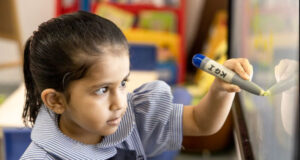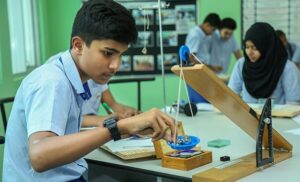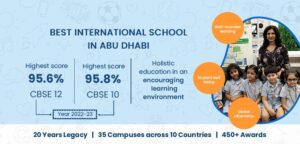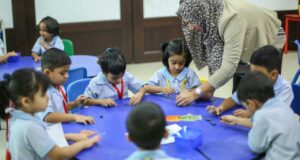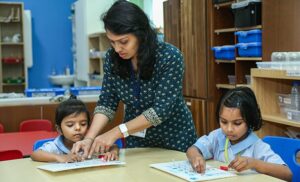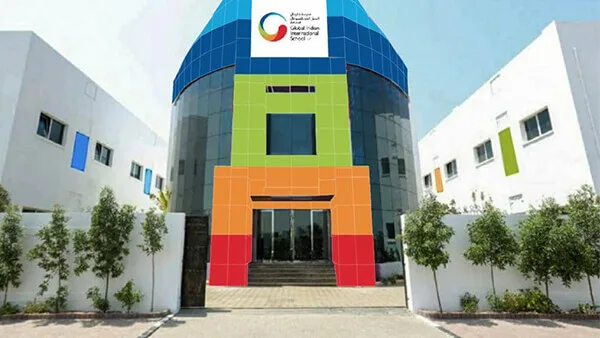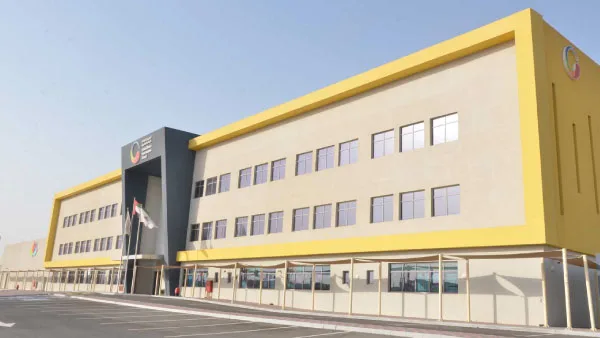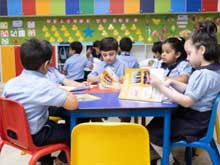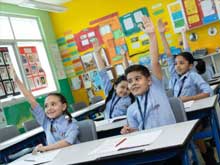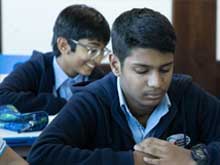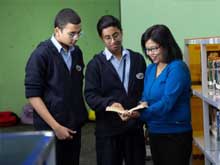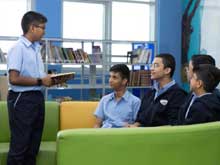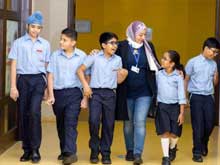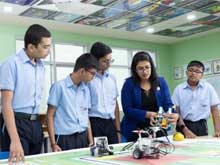Abu Dhabi, a city known for its towering skyscrapers, development and technology, the real architectural marvels are the International Indian school that shapes the minds of young generations.
Welcome to the educational landscape, where we explore the diversity of International school approaches in the UAE.
You will soon understand that education here is not a one-size-fits-all model. Instead, it’s an interesting diverse mosaic of philosophies, teaching methodologies, and cultures that come together to offer truly immersive learning experiences and global perspectives on learning
In this article, you’ll gain insights into the different approaches.. From Montessori-inspired nurturing to IB-driven excellence, from British precision to American innovation, each school approach offers unique learning experiences to students
Whether you are a guardian looking for the best education curriculum or an educator eager to expand your knowledge, simply curious to know more about the transformative power of education. With this article, You will definitely gain valuable insights and a profound understanding of education, and its importance for individuals and for the entire community.
So let’s get straight to the point and explore different educational approaches – a gateway to a brighter, more globally aware future.
Unveiling the Educational Framework in the International School UAE: A Comprehensive Guide
In an International Indian school, each aspect of education represents a unique facet that includes the guiding principles, philosophies, curriculum options, teaching methodologies, and ultimate objectives that shape the learning experiences of students.
Here, education is not just a path to gain valuable knowledge; it’s a bridge to a future where diverse cultures and worldviews converge, preparing students for the competitive world and to face future challenges.
Here are the Key Components of the Educational Framework:-
● Global Perspective: International schools emphasize on understanding and appreciation of diverse cultures, languages, and worldviews fostering a global perspective. They provide various International curricula which promote a global outlook.
● Diverse Curriculum: Known for offering a wide range of international or national curricula which help parents and students to choose a curriculum that aligns with their goals and values.
● Multilingual Education: International schools prioritize multilingualism by offering instruction in multiple languages which enables students to become proficient in multiple languages fostering cross-cultural communication skills.
● Innovative Teaching Methods: The use of innovative teaching methods, such as project-based learning, experiential learning, and technology integration aims to engage students actively in their learning process.
● Cultural Diversity: You will see a diverse student body in International schools with students from various cultures and nationalities enriching student’s educational experience by exposing them to different worldviews.
● Global Citizenship: You will understand after enrolling your child to International school, that they are developing global citizenship skills such as being responsible, compassionate, and socially conscious individuals who are aware of global issues and willing to contribute positively to society.
● Extracurricular Activities: One thing for sure you will realize that your children will be happy to have a wide array of options for extracurricular activities such as sports, arts, music etc which will promote holistic development.
● International Accreditation: International schools have accreditation from respected international bodies which ensures high educational standards adding credibility to the school’s educational framework.
● Teacher Qualifications: International schools hire highly qualified and diverse teaching staff which imparts education principles and knowledge ensuring students receive a high-quality education.
● Parental Involvement: Active involvement of parents in their children’s education is a necessity in International schools as it enhances behavior and attendance, personalized learning etc. So parents need to be ready for open communication, parent-teacher associations, and participation in school activities.
● Skill Ready: International schools equip students with 21st century skills; such as critical thinking, problem-solving, creativity, collaboration, and digital literacy, so that they can face the challenges of the future.
● Assessment and Evaluation: International schools adopt various assessment methods to check student progress such as standardized testing, project-based assessments, and continuous feedback.
How are International Schools Different From Other Schools?
International Schools vs.Other Schools
● Curriculum:
● International Schools offer curricula like IB, Cambridge, or national curricula from various countries.
● Other Schools follow the national curriculum of the country where they are located.
● Global Perspective:
● International Schools focus on a global outlook, focusing on diversity, multilingualism, and cross-cultural understanding.
● Other Schools focus on a national or regional perspective
● Student Diversity:
● International Schools have a diverse student body with students from various nationalities and backgrounds.
● Other Schools have a more homogeneous student population from the local region or country.
● Languages Taught:
● International Schools offer instruction in multiple languages, promoting multilingualism.
● Other Schools teach in the national language of the country.
● Teaching Methods:
● International Schools incorporate innovative teaching methods like project-based learning, experiential learning, and technology integration.
● Other Schools use more traditional teaching methods.
● Global Citizenship:
● International Schools promote the development of global citizenship skills and awareness of global issues.
● Other Schools have a limited focus on global citizenship skills.
● Accreditation:
● International Schools often seek international accreditation to meet high educational standards.
● Other Schools accredited by national or regional education authorities.
● Teacher Qualifications:
● International Schools employ highly qualified and diverse teaching staff with expertise in international education.
● Other Schools employ teachers who meet national teaching requirements.
● Parental Engagement:
● International Schools encourage active parental involvement through open communication and school activities.
● Other Schools involve parents to varying degrees, depending on the school.
● 21st-Century Skills:
● Skills Development such as critical thinking, problem-solving, and digital literacy is the main focus of International School
● Other Schools may place less emphasis on skill development.
Exploring Various Approaches of International Schools in Abu Dhabi
Here’s a detailed explanation of various diverse International school approaches that cater to the unique needs and aspirations of students and their families.
1. UAE’s National Curriculum: Embracing Tradition and Modernity
Abu Dhabi’s International schools incorporate the UAE’s National Curriculum such as Arabic language and Islamic studies which helps students to be connected with their roots and also prepares them for the globalized world.
2. British Curriculum: Precision and Global Recognition
Some International schools in Abu Dhabi provide the British Curriculum with rigorous academic standards, recognized worldwide. Students get a taste of the UK’s educational approach, fostering critical thinking and a strong foundation in subjects like English, mathematics, and science.
3. American Curriculum: Innovation and Flexibility
Some International schools in Abu Dhabi provide an American Curriculum which emphasizes innovation and creativity. The curriculum provides various options in subject choice aiming to encourage students to explore their interests and talents, fostering a well-rounded education, and helping students to think outside the box and adapt to a rapidly changing world.
4. International Baccalaureate (Ib): A Global Awareness
International Baccalaureate (IB) school’s main approach is to offer a holistic, internationally recognized education.The program emphasizes various projects, research skills, and community service which promote global awareness, preparing them to become thoughtful, responsible global citizens.
5. Montessori: Nurturing Young Explorers
Montessori Methods focus on the development of values, independence, self-discovery, and hands-on learning. Children are encouraged to explore their interests at their own pace, fostering a love for learning and developing a strong foundation in early education.
6. STEAM Education: Fostering Creativity and Problem-Solving
Many International schools in Abu Dhabi offer STEAM (Science, Technology, Engineering, Arts, and Mathematics) curriculum which bridges the gap between traditional subjects and the real-world applications of technology, encouraging students to be curious, creative, and innovative.
7. French Curriculum: Language Learning
French Curriculum-based schools provide rigorous academic training, and students gain fluency in French and a deep appreciation for France’s rich heritage.
8. Indian Curriculum: Academic Excellence and Cultural Connection
Indian Curriculum like CBSE-based schools provides a strong academic foundation with a focus on mathematics, science, and languages. Students are connected to their Indian cultural heritage through festivals, language classes, and cultural events.
What are the Best Educational Approaches Adopted by GIIS their Students
Global Indian International School (GIIS) Abu Dhabi is known for adopting innovative educational approaches that promote holistic development and prepare students for the future. Here are six key educational approaches adopted by GIIS Abu Dhabi for the students.
● Global Citizenship Education:
GIIS Abu Dhabi emphasizes global citizenship education, encouraging students to understand and engage with global issues, and developing a sense of responsibility towards the global community.
● Holistic Learning through STEAM:
STEAM (Science, Technology, Engineering, Arts, and Mathematics) is part of various GIIS curricula which nurtures skills like creativity, problem-solving etc. preparing students for future careers.
● Social and Emotional Learning (SEL):
The SEL approach focuses on developing students’ social and emotional skills, including empathy, resilience, and self-awareness. These skills are essential for building strong interpersonal relationships and emotional well-being in today’s world.
● Project-Based Learning:
It is a core component of the educational approach where students learn from doing practical things which encourage critical thinking, collaboration, and real-world problem-solving.
● 21st-Century Skills Development:
Equipping students with 21st-century skills such as communication, adaptability, and digital literacy is GIIS’s main focus.
● Cultural Integration:
GIIS Abu Dhabi celebrates the rich cultural diversity of its student body. The school promotes cultural integration through various activities, events, and festivals, allowing students to embrace their own cultures while appreciating and respecting others.
● Multilingual Education:
The school offers multilingual language proficiency and cross-cultural understanding which is essential in a globalized world.
● Extracurricular Activities:
Extracurricular activities are an important part of the educational approach in GIIS, which includes sports, arts, music, and community service to promote holistic development.
● Technology Integration:
Leveraging technology in education is crucial in the 21st century. GIIS integrates technology into the learning process to enhance engagement and prepare students for a tech-driven world.
Note:- Get the most accurate information about the educational approach and school fees of GIIS Abu Dhabi, by visiting their official website or contacting the school directly.
Conclusion
The International school strategies shine as beacons of innovation and inclusivity. The world of education here is a reflection of the city itself – a harmonious blend of tradition and modernity, diversity and unity.
Frequently Asked Questions
What’s Special About International Schools?
International schools offer a global perspective, diverse cultures, and multilingual education, preparing students for a connected world.
What is the Most Popular Curriculum in International Schools?
The popularity of curricula varies, but options like the International Baccalaureate (IB) and British or American curricula are offered by International School
What are the Challenges of Education in the UAE?
Challenges in UAE education include balancing tradition with innovation, catering to a multicultural student body, and adapting to a rapidly changing world.
What are the Second Language Options for CBSE Schools in Abu Dhabi?
Second language options in CBSE schools typically include Hindi, French, Arabic, and other languages to support a well-rounded education.





